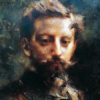Primo Levi

Primo Levi
Primo Michele Leviwas an Italian Jewish chemist, writer, and Holocaust survivor. He was the author of several books, novels, collections of short stories, essays, and poems. His best-known works include If This Is a Man, his account of the year he spent as a prisoner in the Auschwitz concentration camp in Nazi-occupied Poland; and his unique work, The Periodic Table, linked to qualities of the elements, which the Royal Institution of Great Britain named the best science book ever written...
NationalityItalian
ProfessionScientist
Date of Birth31 July 1919
CountryItaly
Monsters exist, but they are few in number to be truly dangerous
We who survived the Camps are not true witnesses. We are those who, through prevarication, skill or luck, never touched bottom. Those who have, and who have seen the face of the Gorgon, did not return, or returned wordless.
We must be listened to: above and beyond our personal experience, we have collectively witnessed a fundamental unexpected event, fundamental precisely because unexpected, not foreseen by anyone. It happened, therefore it can happen again: this is the core of what we have to say. It can happen, and it can happen everywhere.
There is Auschwitz, and so there cannot be God.
Everybody is somebody's Jew. And today the Palestinians are the Jews of the Israelis.
Even in this place one can survive, and therefore one must want to survive, to tell the story, to bear witness; and that to survive we must force ourselves to save at least the skeleton, the scaffolding, the form of civilization. We are slaves, deprived of every right, exposed to every insult, condemned to certain death, but we still possess one power, and we must defend it with all our strength for it is the last — the power to refuse our consent.
Dawn came on us like a betrayer; it seemed as though the new sun rose as an ally of our enemies to assist in our destruction.
Each of us bears the imprint of a friend met along the way; In each the trace of each.
Darwin was not afraid to look deeply into the void. His bold view can be seen as either noble and pessimistic or noble and admirable. For people of science, he is a hero. Denying man a privileged place in creation, .. he reaffirms with his own intellectual courage the dignity of man.
The aims of life are the best defense against death.
Perfection belongs to narrated events, not to those we live.
It is the duty of righteous men to make war on all undeserved privilege, but one must not forget that this is a war without end.
Perhaps one cannot, what is more one must not, understand what happened, because to understand [the Holocaust] is almost to justify...no normal human being will ever be able to identify with Hitler, Himmler, Goebbels, Eichmann, and endless others. This dismays us, and at the same time gives us a sense of relief, because perhaps it is desirable that their words (and also, unfortunately, their deeds) cannot be comprehensible to us. They are non-human words and deeds, really counter-human...
In order for the wheel to turn, for life to be lived, impurities are needed, and the impurities of impurities in the soil, too, as is known, if it is to be fertile. Dissension, diversity, the grain of salt and mustard are needed: Fascism does not want them, forbids them, and that's why you're not a Fascist; it wants everybody to be the same, and you are not. But immaculate virtue does not exist either, or if it exists it is detestable.